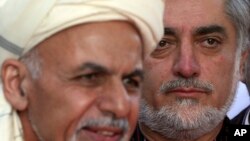Both camps in the Afghan unity government have expressed disappointment at the low number of new ministers approved by lawmakers Wednesday, even as they promise to respect the parliament’s decision.
Four months after the formation of a government between President Ashraf Ghani and Chief Executive Abdullah Abdullah, Afghanistan now has nine Cabinet members. All key ministries but defense now have new leaders, but most nominees — 10 out of the total of 19 — were rejected by the parliament.
Javid Faisal, deputy spokesman for Abdullah, said leaders had worked hard to put forward competent candidates, “but as expected, the parliament did not contribute to this process, the parliament did not pay attention to the expectations of the nation. But still we, as the government, respect their decision.”
Ghani adviser Daoud Sultanzoy said the low number was due to political jockeying in the parliament.
But some analysts said the Afghan parliament acted as it should have: independently of the government.
Shahmahmood Miakhel, Afghanistan director for the Washington, D.C.-based U.S. Institute for Peace, said democracy had worked in these elections.
“The good thing was that it was not based on ethnic or political affiliations," he said. "So the people from every ethnic group or every political background were rejected by the parliament.”
Miakhel said he thought parliament had done a good job in electing only candidates qualified to do their jobs. Now, he said, the unity government has to go back to the drawing board to come up with new names for the next round.




